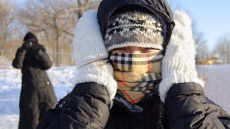Lack of physical activity has resulted in fragile bones among modern races compared to early human species, researchers have found.
The team from Pennsylvania State University set out to test three potential explanations for this.
"The most plausible explanation is that a lack of constant physical activity causes the bone in the head of the femur - the long bone in the thigh - to become thinner and lighter than those found in modern primates such as chimpanzees, gorillas and orangutans," explained Timothy M. Ryan, associate professor of anthropology and information science and technology.
The second explanation is that humans and non human primates have different bone structure because of genetics - with humans evolving to a lighter, more gracile structure.
The third explanation that the large joint surfaces required for upright, two-legged movement decrease the strain on bone and therefore, the development of strong bones, does not appear to be true.
The researchers used non-invasive tomography to scan the hip joint ends of the femurs.
In all, the study included 59 adult humans and 229 non human primates.
The researchers found that the agriculturalists had significantly lower bone mass than the foragers.
However, the bone characteristics of the more mobile foragers overlapped with those of the non human primates.
"The findings have significant implications for understanding human skeletal form and its relationship to age-related bone loss in contemporary human populations," the team reported in the journal Proceedings of the National Academy of Sciences.






